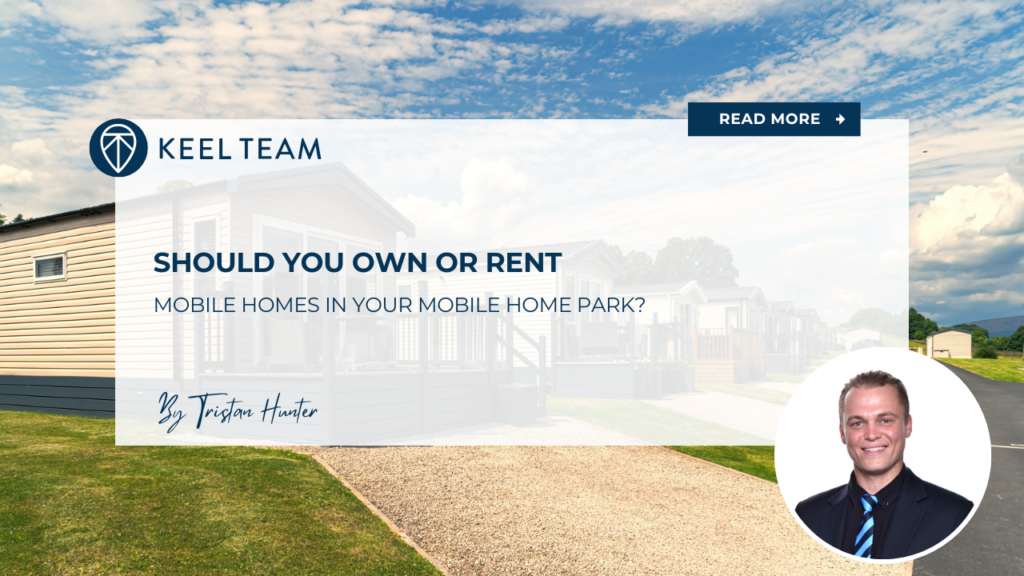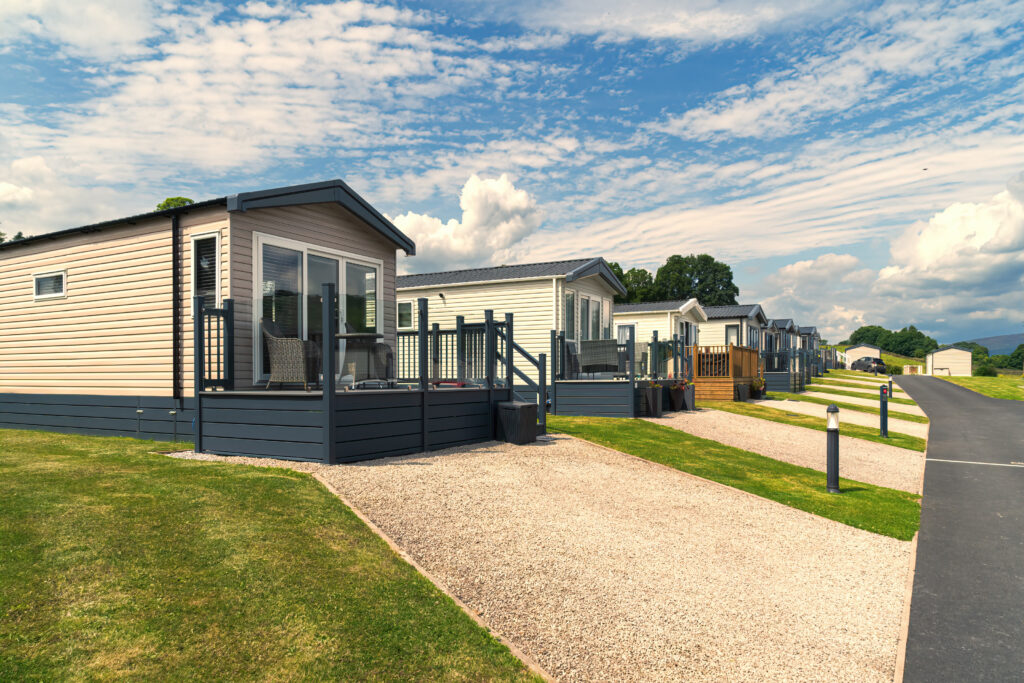Should You Own or Rent Mobile Homes in Your Mobile Home Park?
-
 Tristan Hunter - Investor Relations
Tristan Hunter - Investor Relations

When investing in a mobile home park, one of the most important strategic decisions involves the type of ownership model you implement. Specifically, do you focus on park-owned homes, where you own and rent out the mobile homes themselves? Or do you build a tenant-owned home model, where residents own their homes and rent only the land?
There are typical pros and cons to each structure. This article explores the key differences, with a focus on revenue, maintenance responsibilities, and risk exposure. While there’s no one-size-fits-all answer, understanding the trade-offs can help mobile home park owners make informed decisions.
What Are Park-Owned Homes?
In a park-owned home model, the mobile home park owner not only owns the land but also the mobile homes situated on that land. These homes are typically rented out to residents, much like single-family rentals.
This model generally offers more control over the tenant experience and often produces higher gross revenue. However, it also comes with additional responsibilities that require active management.
Download our FREE eBook on the Top 20 things to know BEFORE investing in mobile home parks!
What Are Tenant-Owned Homes?
In a tenant-owned home model, the mobile home park owner leases the land to residents who own their mobile homes. The tenant is responsible for the upkeep of the home itself, while the owner maintains common areas and infrastructure.
This model tends to be more passive, with lower maintenance responsibilities and operational costs. It is often preferred by mobile home park owners and lenders who want predictable cash flow with fewer day-to-day obligations.
Revenue Potential: Park-Owned vs. Tenant-Owned Homes
Park-Owned Homes:
Owning and renting out mobile homes in your mobile home park can offer higher monthly income per lot. For example, instead of collecting $400 per month in lot rent, you might collect $800 to $1,000 by including rent for the home. Over time, this can lead to higher gross income across the entire mobile home park.
However, this higher income often comes with higher expenses. Property taxes, insurance, repairs, and vacancies tend to reduce net operating income, which can flatten margins if not managed carefully. Park-owned home income also doesn’t impact the valuation of the asset, and is generally for cash flow purposes.
Tenant-Owned Homes:
Tenant-owned homes typically yield lower monthly income per unit, since you’re only charging for the land. However, because tenants are responsible for their own maintenance, your operating costs may drop significantly. This can lead to higher net operating income relative to your gross income, creating a leaner and more efficient business model.
Maintenance and Management Burden
Park-Owned Homes:
When you own the homes, you’re also responsible for repairs, upgrades, and turnover costs when a tenant moves out. This can involve plumbing, HVAC, flooring, and even full home replacements if units become uninhabitable.
In addition, tenants in park-owned homes may treat the property differently, since they have no ownership stake. This can result in more frequent repairs and a greater need for property management oversight.
Tenant-Owned Homes:
In tenant-owned home scenarios, residents typically have more pride of ownership. They are responsible for the home’s upkeep and often stay longer. This leads to lower turnover, fewer maintenance calls, and a more stable mobile home park environment.
However, it’s important to maintain high standards for incoming homes and enforce rules to ensure the mobile home park remains clean, orderly, and compliant with local regulations.
Risk and Liability
Park-Owned Homes:
This model carries more liability. You’re responsible for the homes, which means you’re also responsible if something goes wrong—such as a water leak, electrical issue, or structural failure. Insurance costs also tend to be higher for park-owned homes, and tenant issues can become more complex legally.
Vacancy risk is also elevated. If a tenant moves out, you can’t simply wait for the next person to move in with their own home—you have to turn the unit, advertise, and often offer move-in incentives to fill the space.
Tenant-Owned Homes:
The risk shifts to the resident. If the home has issues, it’s up to the tenant to resolve them. Vacancy risk is lower because moving a mobile home is expensive and logistically difficult, meaning most tenants stay for years.
However, if a tenant decides to abandon a home, you may be left with the challenge of rehabbing, removing, or replacing it. These situations can still involve time and capital, so it’s not entirely passive.

Tenant Quality and Stability
Park-Owned Homes:
Tenant quality can vary, especially in areas with high demand for low-cost rentals. Renters may not treat the property with the same care as an owner would, which can lead to higher turnover and more frequent disputes.
However, this model may allow you to serve a larger market of individuals who can’t afford to purchase a mobile home outright, expanding your potential tenant pool.
Tenant-Owned Homes:
Tenants who own their homes tend to treat the property better and stay longer. This often translates into a more stable, tight-knit community, which can be a major asset to your mobile home park’s long-term success.
On the other hand, barriers to entry are higher, meaning you may need to help new tenants finance or move in their homes, particularly if your market has low mobile home inventory.
Which Model Is Right for Your Mobile Home Park?
There’s no universal answer. The decision to pursue park-owned homes or tenant-owned homes depends on your investment goals, operational capacity, and risk tolerance.
- If you’re aiming for higher short-term revenue and are comfortable managing properties, park-owned homes may be the right choice.
- If you prefer long-term stability, lower overhead, and less intensive management, a tenant-owned home model may suit your needs better.
In practice, many mobile home park investors adopt a hybrid approach—owning some homes while encouraging tenant ownership when possible. This gives flexibility while allowing a gradual transition toward a more passive model.
Final Thoughts
Owning versus renting mobile homes in your mobile home park involves a strategic trade-off between control, cash flow, maintenance, and risk. While owning homes can increase revenue, it also increases complexity. Renting lots to tenants who own their homes offers simplicity and stability but may reduce gross income.
Understanding these dynamics can help you make better decisions as a mobile home park owner. Whether you’re acquiring your first property or optimizing your current portfolio, it pays to evaluate both models carefully.
Are you looking for MORE information? Book a 1-on-1 consultation with Andrew Keel to discuss:
- A mobile home park deal review
- Due diligence questions
- How to raise capital from investors
- Mistakes to avoid, and more!
Disclaimer:
The information provided is for informational purposes only and is not investment advice or a guarantee of any kind. We do not guarantee profitability. Make investment decisions based on your research and consult registered financial and legal professionals. We are not registered financial or legal professionals and do not provide personalized investment recommendations.

Tristan Hunter - Investor Relations
View The Previous or Next Post
Subscribe Below 👇





